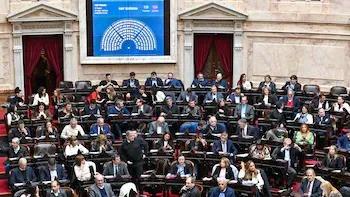The Opposition Prevails: An Analysis of the Veto on the Disability Emergency Law
In a recent session, the Chamber of Deputies of Argentina rejected President Javier Milei's veto of the law declaring a disability emergency. This event occurs in a context of growing political tension, where the decisions of the new government generate polarized reactions. The rejection, which was carried out with 172 votes in favor, reflects not only the opposition to the policies of the current executive but also a deep concern for the rights of people with disabilities in the country.
📊 Current Landscape
The law in question was originally approved in a context of social and economic crisis, aiming to ensure resources and attention to a historically marginalized sector. Milei's veto, arguing the need to adjust public spending, was met with strong condemnation from organizations advocating for the rights of people with disabilities. The annulment of the veto not only reaffirms the political will to protect fundamental rights but also poses a challenge to the government in its attempt to implement an austerity agenda.
The data is telling: it is estimated that there are over 7 million people with some type of disability in Argentina. This population faces significant barriers, both social and economic. The disability emergency law, which is now continuing its legislative course, aims to address these urgent needs through the allocation of specific resources. Thus, the rejection of the veto becomes a symbolic and practical act of defense of human rights.
🌍 International Comparison
In terms of public policies, Argentina's situation is not unique. Countries such as Sweden and Canada have implemented legislation that guarantees rights for people with disabilities, providing access to health services, education, and employment. For example, in Sweden, the Disability Act of 1994 establishes a comprehensive framework for the inclusion of people with disabilities in all aspects of social and economic life.
Canada, for its part, has developed an approach based on the UN Convention on the Rights of Persons with Disabilities, which promotes equal opportunities. The contrast with Argentina is striking: while these countries have consolidated inclusive policies, the struggle for basic rights in Argentina remains a constant challenge, evidenced by the recent controversy surrounding the presidential veto.
⚖️ Implications of the Veto
The rejection of the veto has significant implications on several levels. Firstly, it reaffirms the responsibility of the State in the protection of the rights of people with disabilities, a commitment that transcends the political context and delves into the realm of human rights. Secondly, this event may influence the public perception of Milei's government, which is facing criticism for its austerity policies and its approach to social spending.
Furthermore, the rejection of the veto could set a precedent for future legislative decisions. The Congress's ability to counter the Executive's agenda may strengthen institutionalism and the autonomy of the legislative power, although it could also intensify political polarization in the country. The opposition's ability to organize and mobilize support around human rights issues becomes a crucial indicator for the future of political debate in Argentina.
🛡️ Final Reflections
The recent decision of the Chamber of Deputies represents a turning point in the fight for the rights of people with disabilities in Argentina. However, the path towards true inclusion and attention to their needs remains long and complex. The annulment of the veto is not an end in itself, but a first step in a process that will require sustained commitment from all sectors of society.
It is imperative that the government, the opposition, and civil society work together to build a framework that guarantees the rights of all citizens, regardless of their abilities. Inclusion is not a luxury but a fundamental necessity for the social and economic development of the country. Argentina does not need more patches; it needs direction. History has taught us that progress is achieved through dialogue and collaboration, not through polarization. The opportunity to advance towards a fairer future lies in our hands.

Comments